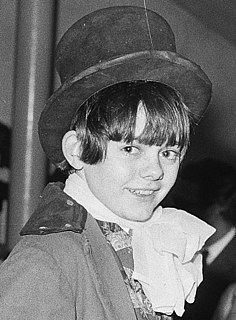A Quote by Jack Wild
I'm thought of as a celebrity. Everything I've ever done... has been for children. As long as I was working constantly, that was fine, because, although I don't have any children, I do relate better to them than adults.
Related Quotes
Working with children is very different than the way in which I work with adults. I never tell the children the actual truth of the thing that I want them to act. Although children are really into play and play acting, and this is a major part of their existence, they never actually find the playing or acting of adults credible.
Although we like to think of young children's lives as free of troubles, they are in fact filled with disappointment and frustration. Children wish for so much, but can arrange so little of their own lives, which are so often dominated by adults without sympathy for the children's priorities. That is why children have a much greater need for daydreams than adults do. And because their lives have been relatively limited they have a greater need for material from which to form daydreams.
Although adults have a role to play in teaching social skills to children, it is often best that they play it unobtrusively. In particular, adults must guard against embarrassing unskilled children by correcting them too publicly and against labeling children as shy in ways that may lead the children to see themselves in just that way.
The new concept of the child as equal and the new integration of children into adult life has helped bring about a gradual but certain erosion of these boundaries that once separated the world of children from the word of adults, boundaries that allowed adults to treat children differently than they treated other adults because they understood that children are different.
If you want your children to relate to the culture you live in, if you want to train them outside of the general system, you have to tell your children that ordinary children tend to say things like 'I can run faster than you; I can draw better than you; I know things you don't know'. You have to tell them what normal children are like. Normal children are messed up and you have to tell them about that. But if you instruct your child in high correlation with the physical world, they won't be able to relate with normal children. Normal means mixed up as I use the word.
Adults constantly raise the bar on smart children, precisely because they're able to handle it. The children get overwhelmed by the tasks in front of them and gradually lose the sort of openness and sense of accomplishment they innately have. When they're treated like that, children start to crawl inside a shell and keep everything inside. It takes a lot of time and effort to get them to open up again. Kids' hearts are malleable, but once they gel it's hard to get them back the way they were.
Many teachers think of children as immature adults. It might lead to better and more 'respectful' teaching, if we thought of adults as atrophied children. Many 'well-adjusted' adults are bitter, uncreative, frightened, unimaginative, and rather hostile people. Instead of assuming they were born that way, or that that's what being an adult entails, we might consider them as people damaged by their education and upbringing.
I have been working with UNICEF Peru a lot. I am aiming to educate children, mostly because once adults reach adulthood, your views are shaped. With children, you can really teach them, you can open their eyes to what is really going on. The only way we can open their eyes and free them is by educating them.
Adamson feels that drug developers are unreasonably concerned about rare events. The reality is children tolerate phase I therapy new agents being tested to find the best dosage and possible side-effects as well as or better than adults, ... Once the initial studies are done that is, phase I trials in adults study should begin in children.


































